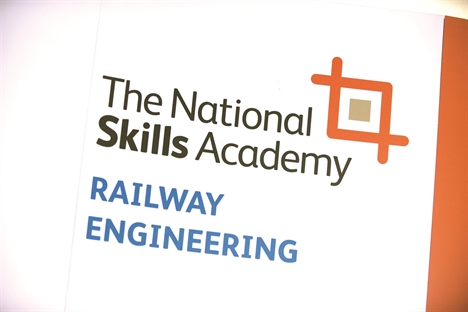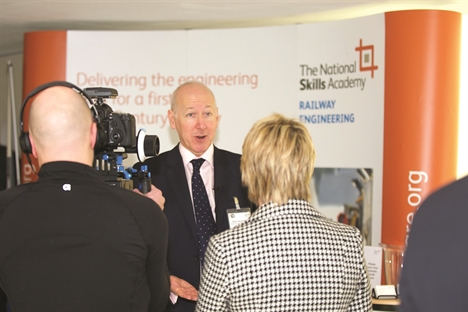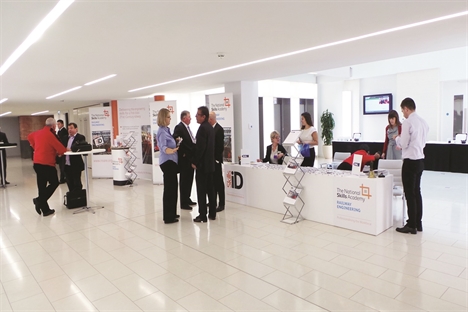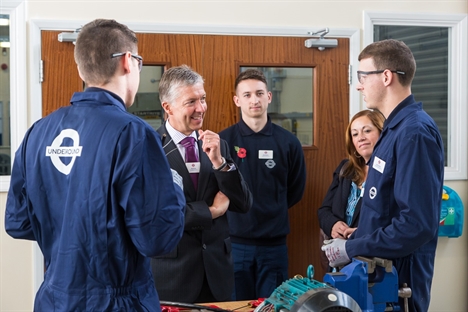01.11.15
Fixing the skills shortages – Interview with NSARE's Neil Robertson
Source: RTM Oct/Nov 2015
Neil Robertson took over from Gil Howarth as chief executive of NSARE, the National Skills Academy for Railway Engineering, in the summer. RTM’s Adam Hewitt went to talk to him at the organisation’s London headquarters.
RTM has chronicled the founding, development and achievements of NSARE extensively in recent years, and its new boss, Neil Robertson, has big ideas for the future.
Robertson joined NSARE from Energy & Utility Skills, where he was CEO for three years. He has also worked at the Department for Business, Innovation and Skills (BIS) and as director of training at Babcock International.
We met Robertson at NSARE’s offices in Carteret Street, near the Houses of Parliament, where he told us: “NSARE’s only purpose is to support the skills efforts of the industry, and its members in the industry. It’s not there for any other purpose than that; it’s a support service to help the industry drive the delivery of the various skills strategies.
“We’ve done a good job in NSARE of identifying and quantifying skills shortages. It’s now time to get on and fix them.”

Some of the most intense skills shortages are coming in early CP6, forecasts show, with a peak in retirements expected then. NSARE wants the regulator – the Office of Rail and Road – to consider the one-off costs to the industry associated with those retirements, as the energy regulator has done in its sector. He also wants to ensure the industry doesn’t just let that experience become lost, but instead keeps those retiring involved, perhaps as trainers, assessors, mentors or ambassadors for the industry who can visit schools and colleges.
Ultimately, he said, even skills development is just a means to an end – and that end is productivity. That will be a big agenda for rail in the coming years, he said, citing work by John Lewis Partnership chair Sir Charlie Mayfield, who is looking into productivity in his capacity as chair of the UK Commission for Employment and Skills.
NTAR
NSARE has been heavily involved in the creation and construction of NTAR, the National Training Academy for Rail, in Northampton, working with partners including BIS, Siemens and the Department for Transport. RTM visited the facility for a detailed report in our previous edition, since when it has had its official ribbon-cutting launch.
Robertson reiterated that the facility is for the whole industry, and said: “The suppliers who’ve kitted out the training rooms, like AlanDick Communications (see page 27) – I’m blown away by their generosity and commitment to training.
“There’s so much goodwill in the industry. Plus, it’s more than a training facility, it’s also a world-class business space. We want industry to use it.”

Training the trainers
Among NSARE’s duties is to point out “uncomfortable truths” like the desperate shortage of trainers in the rail industry, Robertson said. When the organisation was first established, it introduced a quality assurance process for trainers and training companies. This definitely had an impact: training provision improved, and some of the worst companies are no longer trading. That will remain an element of NSARE’s work, though Robertson said the hard work has now been done and the principle of quality assurance is well-established.
NSARE also got a lot of attention for its detailed skills forecasting analyses, using private industry data. That has helped major client organisations, not least Network Rail, make their own plans for the future.
It also turned heads in government, including at the Treasury. Robertson said that with the government spending billions on infrastructure, and knowing that labour costs will take up perhaps 40% of that spending, there is concern at the highest levels to ensure the workforce and skills are there to get good value out of that investment.
“We cannot be the next offshore wind, it will damage our ability to attract funding from the Treasury,” Robertson said, referring to the perception that lots of government money spent on offshore wind went to foreign contractors and workers. “We have to attract our own people.”
With conservative estimates of 30% wage inflation over the next five years, plus chronic skills shortages of overhead linesmen, it is sensible for the Treasury to be involved, he told us.

‘Clumsy’ levy on employers
But Robertson criticised the government’s new apprenticeship levy on big employers, under which they are forced to contribute more money to funding for apprenticeships, which is then redistributed via vouchers. Robertson said the system will be bureaucratic, time-consuming and counter-productive.
He explained: “I genuinely think it will make it harder for us to hit our apprenticeship target, which is extremely disappointing.
“I still think we’ll hit it – we’re not going to let it stop us. But it’s an old-fashioned, clumsy tool.”
The model should instead be co-investment between government and industry, as is happening with NTAR and the new National College for High Speed Rail for Birmingham and Doncaster (more on page 120). He added: “Let’s have a co-investment plan, please, not a voucher and ‘beat you over the head’ tax. It’s a tax, not a levy. It already operates in the construction and engineering construction sectors, and there is a little one in film. Most people in those sectors will tell you it’s not a great experience. Not all, but most.
“We’re worried about bureaucracy. They’re taking money away, putting it through a process, then giving it back.”
Robertson has gathered feedback from NSARE member companies across the rail industry, and there was widespread dislike of the levy idea. One suggestion, instead of forcing companies to pay the ‘tax’ and then redistributing that money, was for the companies to deduct their spending on apprenticeships from their own tax bills – and guarantee it via their finance director’s signature (their “professional life”, as Robertson put it), as they would on their main tax return. “So no money needs to actually change hands, and there’s no bureaucracy. That was one of the sensible suggestions.”
He noted that those doing best at training are the big companies – those who will be hit by the levy. “So they’re hitting the bit that’s working well, which is not an obvious thing to do with a target of three million [apprentices].”
Apprenticeship target
He questioned the viability of that target, too, noting that there are only 600,000 school leavers a year. “So if it’s only for first-time apprentices, that means everyone leaving school will have to be an apprentice!”
In fact, since about 400,000 of them will go into higher education (after the cap on that was lifted), the potential pool of apprentices is only 200,000 a year, making it very difficult to see where three million over five years will come from, Robertson said.
“If they only let the levy be used for first apprenticeships, that’s only going to help us with half our strategy, because the other half is going to be about the skills of the people who are already [in the rail industry]. We need to make the upskilling programmes into something like looks, feels and smells like an apprenticeship.”

The Treasury’s ‘Fixing the foundations: Creating a more prosperous nation’ document, jointly published with BIS, says: “Levies to fund training are already in place in Germany, France, Denmark and over 50 other countries, often supporting high quality apprenticeship systems…it is now time for the UK to do this as well.
“The levy will apply to large employers and will support all post-16 apprenticeships. In England, any firm will be able get back more than it puts in by training sufficient apprentices.”
NSARE submitted its formal reply to the government in September, and urged its more than 360 member companies to reply individually too.
Robertson, who has also worked as a senior civil servant at what is now BIS, said: “The levy is going to have a big impact, and I think it will happen. We’ll help the industry ensure there is more of an upside than otherwise would have happened.”
When RTM caught up with him just before we went to press, he said he sensed movement from the government on at least one of NSARE’s key concerns – but we will have to wait to see exactly what happens.
Membership
From the start, NSARE has been a membership organisation, and new members are still joining.
Robertson says that since the end of financial support from the government, NSARE will increasingly be focusing on delivering value for its members. “We will focus more on our members’ needs than on the government’s need in our next phase, because they will be our primary funders. We will seek to establish a wider, more commercial aspect to the organisation to allow us to keep membership fees down.”
He added: “However, we do need to review our membership model.”
This is because the organisation wants to deliver much more for its members, especially the biggest companies, but the current “very low” fees won’t necessarily allow that. “I’ve never seen a return on investment of less than 3:1 on those fees,” he added.
NSARE also wants to continue its work on industry promotion, attracting new talent to the industry, working alongside the existing campaigns and organisations focusing on this.